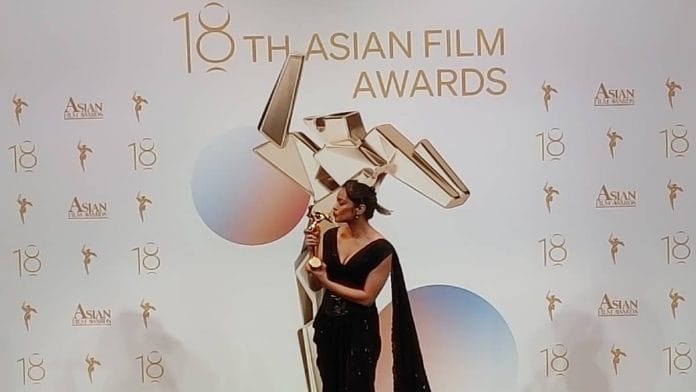Kowloon, Hong Kong: Dressed in a long black shimmery gown, Bollywood actress Shahana Goswami took the stage Sunday at Xiqu Centre in Hong Kong’s West Kowloon Cultural District, holding her golden award with a radiant smile.
As she proudly flaunted the honour for the media, journalists from across Asia requested her to kiss the trophy—and she complied.
Goswami’s film Santosh, after its Oscar nomination, secured two honours at the 18th Asian Film Awards, with Goswami winning Best Actress and director Sandhya Suri bagging Best New Director.
Goswami described Santosh as a “very subtle film” where a lot of things are unsaid but depicted very clearly, and everyone understands it—without spoon-feeding, without underlining, without deviating from the story.
In an interview with ThePrint before the awards ceremony, Goswami spoke about why Santosh has been receiving critical acclaim.
“It’s about culture, it’s about humanity, which is universal. I think, internationally, people remarked on those things, and connected with those things,” she said. “You feel happy that your film has been understood, in an equal manner, internationally and nationally.”
Santosh portrays Goswami as a determined widow who inherits her late husband’s police constable job. As she investigates a Dalit girl’s murder with a veteran inspector (Sunita Rajwar), she confronts institutional corruption.
According to the actress, the most striking aspect of the film is its universal reception. She said that both Indian and international audiences had reacted similarly to the film, unlike some movies that resonate in one region but not the other.
In Santosh, she said she didn’t notice that divide. Audiences in India appreciated its realism and depiction of social realities, while international viewers, despite unfamiliarity with the context, connected with its human aspects and broader social constructs, she explained.
Also Read: ‘A female director doesn’t mean no male gaze’—Kani Kusruti is so much more than All We Imagine
‘Santosh is a mirror’
Goswami described Santosh as a “mirror” reflecting reality with simplicity. The film presents its story without over-emphasising blame, allowing viewers to see themselves in it.
While following the protagonist’s investigation, the audience also observes the society around her. Goswami pointed out that the film subtly reveals internal biases and contradictions, showing how people often act one way but think another.
“It forces you to think,” she said.
According to Goswami, as an actor, she always fears that her performance might not feel authentic, especially when portraying Santosh, a character vastly different from herself.
While every role is distinct, she believes actors channel aspects of themselves into their characters. Stepping into Santosh’s world brought an added sense of nervousness, she said.
“There is a fear that can I do justice to it? Will I be able to do it right? Am I the right choice for this film? That self-doubt. It was the biggest fear for me. It was over, when we started shooting. That was my biggest challenge,” she told ThePrint.
While discussing the caste system and misogyny in India, Goswami emphasised that the root cause of caste and gender bias and inequality was power. She said Santosh effectively highlights power dynamics in every aspect of its storytelling.
“What is the ultimate, root problem of everything? Power. In Santosh, I have noticed that everything shows the power dynamic,” she said, adding that power can corrupt, regardless of gender and caste.
For example, she said, even when a woman holds authority, she can become part of the same oppressive system, and that corruption exists at all levels, whether in caste or gender dynamics.
While the push for equality aims to bring people together, Goswami acknowledged that the balance can sometimes shift in unexpected ways, reflecting an ongoing evolution.
“Ultimately, people’s thinking has to change. No matter how much you bring change in the system, if people’s thinking does not change, then actual progress will not happen,” she said.
(Edited by Nida Fatima Siddiqui)






